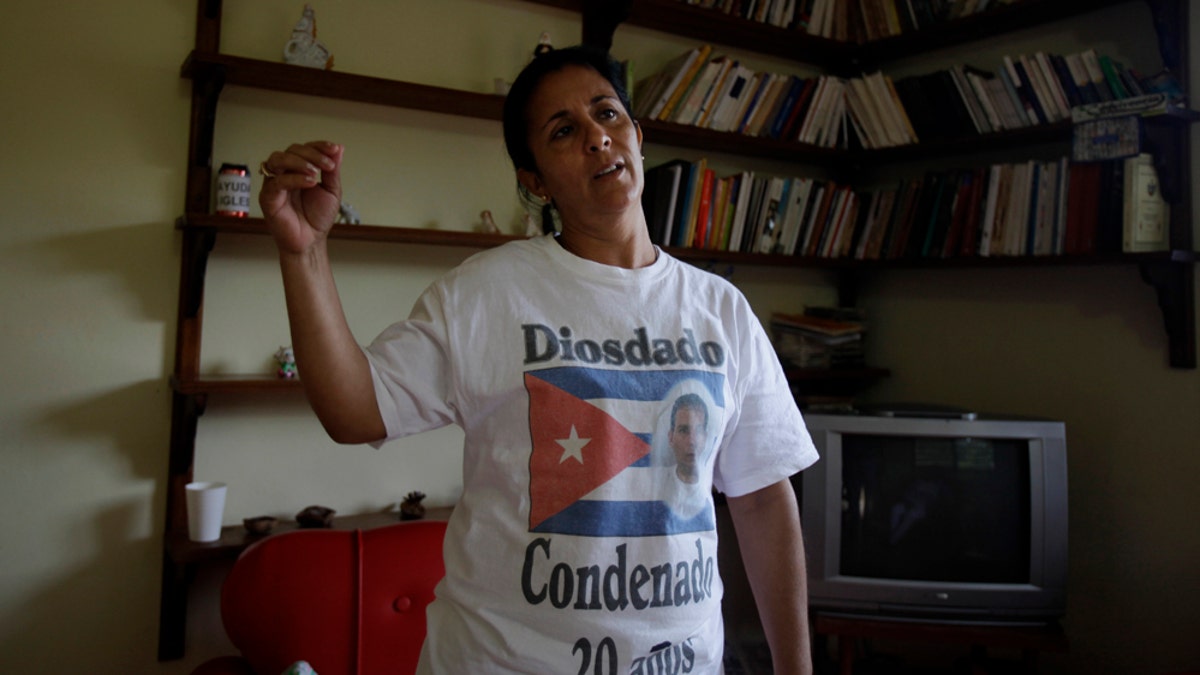
Alejandrina Garcia, one of the founding members of the "Ladies in White" opposition group, speaks in her home in Matanzas, Cuba, Friday, Jan.28, 2011. Garcia began a hunger strike demanding the immediate release of her husband Diosdado Gonzalez. Although Cuba promised to free all 52 remaining opposition figures from a 2003 crackdown on dissent, following a July deal with the Roman Catholic Church, 11 remain behind bars, including Gonzalez. (AP Photo/Javier Galeano)
Cuba will free two prominent political prisoners and allow one of the men to remain in the country, the Catholic Church in Havana said Friday, a powerful indication that a long impasse over the fate of the last remaining activists jailed in a notorious 2003 crackdown on dissent may be coming to an end.
The two men, Angel Moya and Guido Sigler, had refused a government deal to go into exile and insisted on staying in Cuba, along with the other nine dissidents who remain in Cuban jails nearly seven months after the government agreed in principal to free them.
Under the agreement, Moya will stay in Cuba while Sigler "has indicated a desire to go to the United States," church spokesman Orlando Márquez said in a statement.
Moya, who was serving a 20-year sentence for treason and other charges, is the husband of Bertha Soler, one of the leaders of the Ladies in White opposition group. The Ladies in White is a group of wives and daughters of political prisoners -- the group formed in 2003 after their male relatives were arrested and jailed following the crackdown.
Sigler, who was sentenced to 25 years in jail, is the brother of another dissident who has already been released.
"I am happy, as it is good news," Soler told The Associated Press moments after learning her husband would be freed. "But I am not totally satisfied because of the government's drip-drip approach" to letting the dissidents out.
She said several of the other prisoners are not in good health and should also be freed immediately.
Cuban President Raúl Castro agreed in July to free all 52 prisoners remaining from the 2003 sweep, which targeted peaceful activists, social commentators, independent journalists and opposition leaders. Roman Catholic Cardinal Jaime Ortega said at the time that the deal called for the men to be out within four months, or by last November.
Authorities quickly released 41 of the men, sending all but one of them into exile in Spain, along with their families. Many dissidents have refused the regime's insistence that they agree to leave Cuba as a condition of their release -- the dissidents maintain that they should not be "deported" from their own homeland.
Some have also vowed that they will continue to press for democratic political change the moment they leave jail.
Pressure has been building on the Cuban government to make good on the agreement.
Last week, the wife of Diosdado González, another of the 11 remaining 2003 prisoners, began a hunger strike to demand her husband's freedom. The protest was joined from behind bars on Tuesday by González and another political prisoner.
The Cuban government had no immediate comment on the impending releases. Authorities rarely acknowledge the dissidents, except to say that they are all common criminals and stooges paid by Washington to destabilize the island.
Based on reporting by the Associated Press.
Follow us on twitter.com/foxnewslatino
Like us at facebook.com/foxnewslatino




